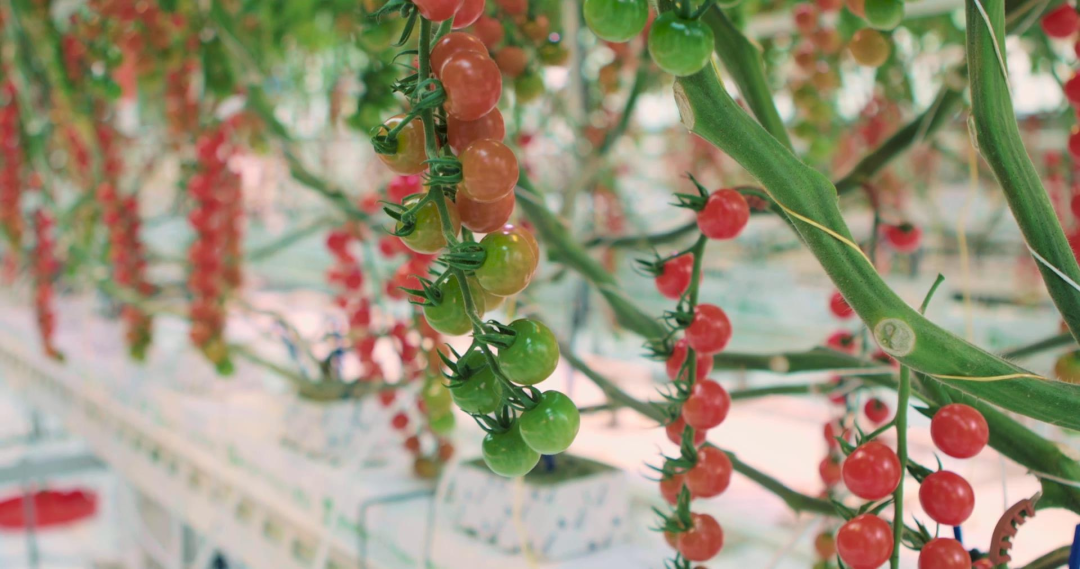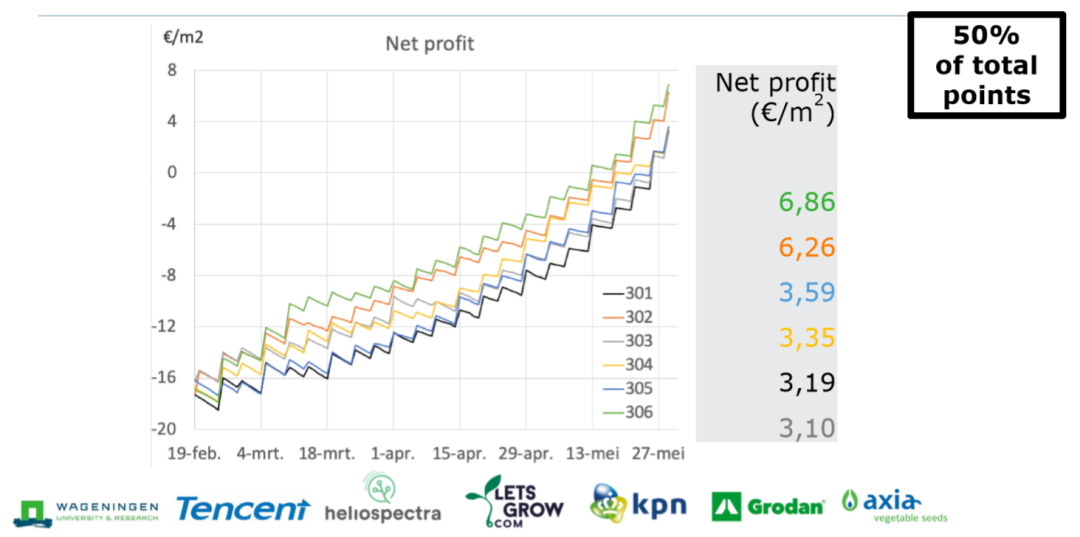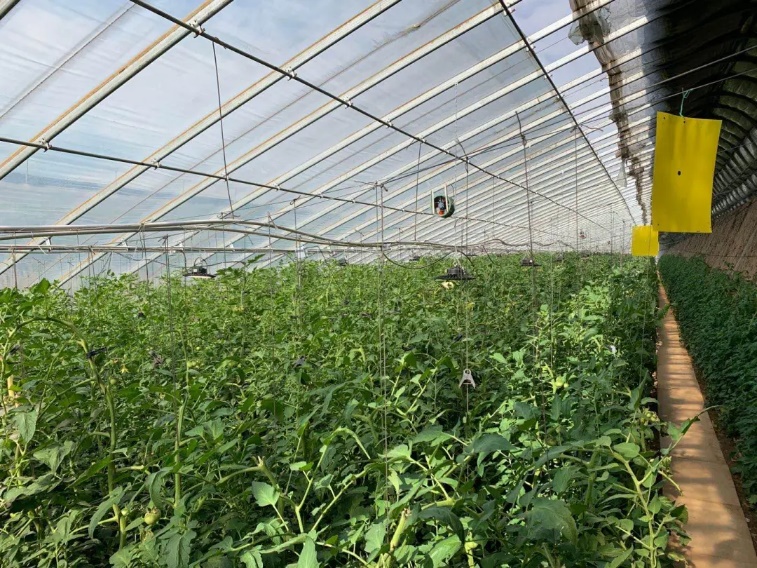Tencent Harnesses AI for Smart Agriculture
On June 9, Tencent AI Lab and Wageningen University & Research (WUR), a world-renowned agricultural research institution based in the Netherlands, announced the winners of the 2nd Autonomous Greenhouse Challenge. Amid the challenges of COVID-19, five teams were able to complete the challenge of growing cherry tomatoes remotely by taking advantage of AI and IoT technologies.?

Cherry Tomatoes Grown by AI
"The goal of the Challenge is to find the best intelligent planting solution for cherry tomatoes in an autonomous greenhouse within 6 months. And the best solution should meet five standards: high quality, high yield, low energy consumption, automation, and technology transferability,” said Dr. Silke Hemming, head of the WUR Greenhouse technology research team and coordinator of the competition. All five teams achieved strong harvest results and outperformed a team of farming experts with 20 years of planting experience. The winning team Automatoes achieved a perfect score and improved resource efficiency by 16 percent and net profit by 121 percent, demonstrating the massive potential of AI in assisting farmers to optimize agricultural decision-making in the future.

Each of the five teams developed AI algorithms outperformed the expert team (303) in terms of net profit.
As tomatoes are one of the main greenhouse crops across the globe, there are many planting and environmental variables that must be monitored and controlled. This year's competition had higher standards for AI and IoT technical solutions and an advanced greenhouse simulator. "The simulator allows the participating teams to obtain simulated results more conveniently and quickly so they can have sufficient data to improve the algorithm and strategy of their AI." said Dr. Luo Dijun, one of the judges of the Challenge and the head of the "AI + Agriculture" team at Tencent AI Lab. The simulator offers broader spectrum of control variables, such as fertilizer concentration, crop management (including topping strategy and fruit-keeping strategy), and the various types of screens used on the greenhouse roofs, allowing more room and challenges for decision-making and optimization.
Participating teams demonstrated the potential of AI solutions for the agriculture industry. DeePC, developed by the champion team Automatoes, is an advanced data-driven algorithm which ensures optimal and safer control compared to the conventional model predictive control algorithm, in both cases of linear and nonlinear stochastic systems. South Korean team Digilog proposed to use reinforcement learning algorithms trained on a combination of historical data, real-time data and simulations to obtain continuous control strategies
"Working with WUR and other partners on a multi-year journey, we have decisively demonstrated that in greenhouses AI can be a superior manager of all of the environmental factors important to the growth of cucumbers and tomatoes,” said David Wallerstein, Tencent's Chief eXploration Officer. "AI can clearly deliver dividends to humanity in terms of boosting food productivity, while actually decreasing resource usage and growing profits. We seek to continuously foster the development of these types of AI applications that can help humanity tackle the myriad global challenges that we face.”
However, there is a data shortage problem in the agriculture industry, caused by various factors such as long production cycles, non-standard data format, and high data collection costs. The capacity of current simulators also need to be improved, for better scalability and transferability of AI solutions in real world. For the future, more data and further iteration of simulators and algorithms will be further pursued to make a difference. Tencent will continue to work with WUR to explore the possibilities of agricultural AI, including research into crop modeling, full-cycle crop management and data-efficient reinforcement learning.
Accelerating the transformation of scientific and technological achievements
Tencent also announced an achievement in the application of iGrow, an AIoT smart agriculture solution developed by Tencent AI Lab and Tencent TEG Architecture Platform Department. iGrow stems from self-developed AI algorithms, key learnings from last year’s growing challenge, and cloud-native computing technologies. In the first phase of the program for growing tomatoes, iGrow improved the net profit per Mu (1/15 ha) by thousands of RMB per season.

A greenhouse managed by iGrow
The iGrow smart planting solution has the advantages of being autonomous, intelligent, adaptable, high-precision and high-efficiency. With IoT sensors it can collect environmental data such as air/soil temperature and humidity, carbon dioxide concentration, and photosynthetic active radiation. After being optimized, the iGrow greenhouse simulator can model a large number of planting processes quickly (it can run 82 growth cycles within 15 seconds). In the simulations, reinforcement learning algorithms are used to optimize the planting strategy. The resulting strategy can achieve fully autonomous control of greenhouse climate,? with its ability to use resources accurately, both of the quality and the yield of the crop can be improved.
New Infrastructure Leads to Agricultural Acceleration
With pressing challenges of aging global population, soil erosion, and pollution caused by over-irrigation and over-fertilization, the agriculture industry must undergo a transformation. Moving towards precision agriculture promises an increase in production and resource utilization, helping alleviate the problems of global hunger and pollution. The impact of COVID-19 on global industries and workforce further underscores the need for smart agricultural solutions based on automation and intelligent decision-making.
Agriculture digitalization has already started putting down roots across the globe as governments launch development plans. In Europe and Japan, multiple government programs promote Agriculture 4.0, including employing modern information technologies, advanced agricultural machinery, and smart service platforms for small farms. Consultants predict that the global market value of smart agriculture will reach $30 billion (U.S.) by 2025.?
With the development of AI, new technologies are being applied across the entire agriculture production chain. The most widely used technologies are machine learning, computer vision, big data, and cloud computing. Agriculture is a long-cycle industry that involves many complex physical and biochemical processes. Traditionally, decision making is based on the life-long experience of agricultural experts. It is extremely difficult for humans to process such large amounts of information effectively.?
However, AI has the ability to analyze massive sets of data quickly and accurately, allowing it to learn patterns from the records and improve its decision-making ability through a simulator that takes into account expert’s experiences. This allows the development of a systematic and robust solution that can improve production efficiency in terms of yield and resource consumption. With the technology and experience in this field, Tencent and WUR have started hosting the Autonomous Greenhouse Challenges since 2018. At the same time, Tencent has been collaborating with agriculture institutions and companies to create real-world smart agricultural applications driven by the technologies, including the Chinese Academy of Agricultural Sciences, Chinese Oil and Foodstuffs Corporation (COFCO), and Zhongkai University of Agriculture and Engineering. Tencent will continue to partner with leading industries, academia, and research institutions to expand and realize its vision of a smart agriculture future.
Related Articles

#TencentInnovates to Support Senior Citizens, Keep Birds from Crashing, Reduce Carbon, and Enhance Video Calls
2024.03.18

Mobily, Tencent to Spearhead Global Digital Ecosystem in Saudi Arabia
2024.03.05



